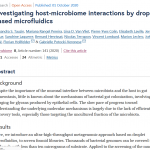MetaFluidics – Advanced toolbox for rapid and cost-effective functional metagenomic screening • microbiology meets microfluidics.
| Project ID | 685474 |
|---|---|
| Funded under | H2020-EU.2.1.4. – INDUSTRIAL LEADERSHIP – Leadership in enabling and industrial technologies – Biotechnology |
| Topic | BIOTEC-6-2015 – Metagenomics as innovation driver (RIA – Research and Innovation action) |
| Call for proposal | H2020-LEIT-BIO-2015-1 |
| Duration | 48 months – from June 1, 2016 to May 31, 2020 |
| Total cost | EUR 8 808 363 |
| Coordinated by | Dr. Aurelio Hidalgo, Universidad Autónoma de Madrid, Spain |
Metagenomes comprise enormous reservoirs coding for proteins with useful activities. Unfortunately, harvesting these reservoirs is difficult, because useful candidates are rare and hidden in an overwhelming majority of irrelevant genes. Screening campaigns of metagenomic libraries thus require massive capital-expenditure for robotic systems and much manpower, making them expensive, slow and available to very few users.
In order to exploit the full potential of the metagenome, the MetaFluidics project assembles an interdisciplinary and intersectoral consortium that will integrate a range of technologies into a platform designed to identify library hits faster, more efficiently and at lower cost. High throughput technologies will ensure that that this platform be employed by a wider user base, enabling SMEs and academic labs to undertake metagenomic campaigns that have so far been costly and limited to large companies.
This platform will be used to identify enzymes for biosynthesis of therapeutic small molecules, for green bioenergy conversion, bioremediation, food chemistry and other industrial applications.
This will be made possible by:
- Ultra-high-throughput screening in picoliter droplets lowering the cost per assay to well below 0.01 cents and enabling 10e7 assays per hour;
- workflows streamlining and increasing the yield of library construction and functional expression;
- workflows for efficient bioinformatic analysis of hits based on user-friendly software solutions for metagenome analysis.
Emphasis will be put on technologies that are straightforwardly implemented in non-specialist labs, thus maximising the impact of MetaFluidics.



